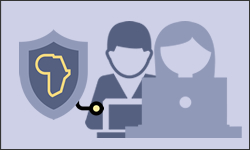Cybersecurity challenges in Africa
With a young population that is rapidly adopting new technologies, Africa is on the verge of an internet boom. To keep pace, Africa needs to urgently address efforts to combat cybercrime and improve its cyber security posture. The current cyber threat landscape in Africa shows that users are being impacted both by threats that are trending globally as well as some that more specific to the region. It will take a concerted effort from international governments, industry, and civil society to fight cybercrime and improve cyber security so that Africa can reach its full potential and stay on track to be a major driver of the global economy.
What is Cybersecurity?
Cybersecurity is the collection of technologies, processes, and practices that protect networked computer systems from unauthorized use or harm. Broadly speaking, cybersecurity topics can be subdivided into two complementary areas: cyber attacks, which are essentially offensive and emphasize network penetration techniques; and cyber defenses, which are essentially protective and emphasize counter-measures intended to eliminate or mitigate cyber attacks.
What is Cyber Hygiene?
Cyber hygiene refers to activities that computer system administrators and users can undertake to improve their cybersecurity while online. The term cyber hygiene was coined by Vinton Cerf, an Internet pioneer, who used that the expression in his statement to the United States Congress Joint Economic Committee on 23 February 2000, where italics are added for emphasis:
It is my judgment that the Internet itself is for the most part secure, though there are steps we know can be take to improve security and resilience. Most of the vulnerabilities arise from those who use the Internet–companies, governments, academic institutions, and individuals alike–but who do not practice what I refer to as good cyber hygiene. They are not sufficiently sensitive to the need to protect the security of the Internet community of which they are a part. The openness of the Internet is both its blessing and its curse when it comes to security.
Why do we need Cybersecurity?
The increasing reliance of our information age economies and governments on cyber (computer-based) infrastructure makes them progressively more vulnerable to cyber attacks on our computer systems, networks and data. In their most disruptive form, cyber attacks target the enterprise, government, military, or other infrastructural assets of a nation or its citizens.
What is malware?
Malware is an umbrella term derived from “malicious software”, and refers to any software that is intrusive (unauthorized access), disruptive, or destructive to computer systems and networks. Malware may take many forms (executable code, data files) and includes, but is not limited to, computer viruses, worms, trojan horses (trojans), bots (botnets), spyware (system monitors, adware, tracking cookies), rogueware (scareware, ransomware), and other malicious programs. The majority of active malware threats are usually worms or trojans rather than viruses.





